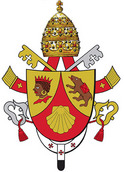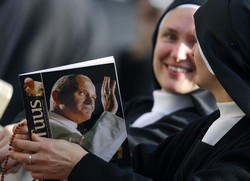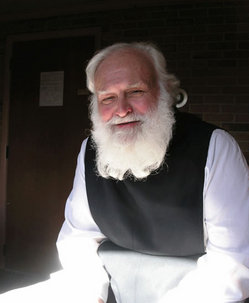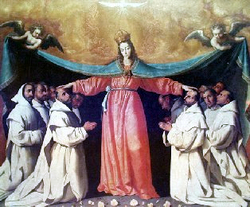Ruth Gledhill of the Times Online (of London) posted this story today on a very unique circumstance: a father & son who poped and are now Catholic priests.
In what is believed to be a first, a father and son, both former Anglican clergy, have been ordained as Catholic priests and are now working for the same archdiocese, Birmingham.
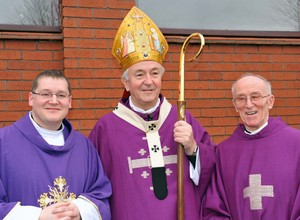 Father Dominic Cosslett, 36, and his father, Father Ron Cosslett, 70, were both ordained by Archbishop Vincent Nichols, pictured above by Peter Jennings. Nichols is the favourite to succeed Cardinal Cormac Murphy-O’Connor as Archbishop of Westminster when he steps down early next year and the latest ordination of Father Dominic on 20 December shows he is continuing in the tradition of true Catholicity to which the British church has so long been witness.
Father Dominic Cosslett, 36, and his father, Father Ron Cosslett, 70, were both ordained by Archbishop Vincent Nichols, pictured above by Peter Jennings. Nichols is the favourite to succeed Cardinal Cormac Murphy-O’Connor as Archbishop of Westminster when he steps down early next year and the latest ordination of Father Dominic on 20 December shows he is continuing in the tradition of true Catholicity to which the British church has so long been witness.
Father Dominic was formerly an Anglican priest at the Church of Christ the King at Lourdes in Coventry. His father, Father Ron Cosslett, aged 70, also a former Anglican priest, was ordained as a Catholic priest by Nichols 3 July 2005. He is now priest-in-charge at St Joseph’s, Darlaston in the West Midlands.
Father Dominic, who is not married, has from a young age felt called to a celibate lifestyle. “Although as an Anglican marriage was open to me the way I live my life is naturally a celibate one,” he told me yesterday. His mother converted five years ago at the same time as his father and his sister and their children followed them over about a year ago.
Father and son concelebrated, celebrating the eucharist at the older Father’s parish, for the first time at Christmas.
“Both of us were in the Catholic tradition of Anglicanism,” said Father Dominic. “Like a lot of us in that tradition, we had always felt the Catholic Church was the rock from which we were hewn. It was always part of our journey, our faith, to seek unity with Rome. We came to the point where we felt we could not exercise our understanding of Catholicism within Anglicanism. It was time for us to go home.”
His father started out in Monmouth, South Wales and then moved to Burslem, one of the Five Towns in the Potteries in the Lichfield diocese. The family returned to Wales and his father’s last Anglican parish was St Paul’s in Swansea.
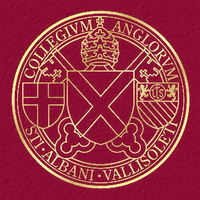 Under the guidelines agreed in the Catholic church for the reception of Anglican clergy who wish to become Catholic priests, Father Dominic, who studied theology at Llampeter and trained for the Anglican priesthood at the high church Mirfield College of the Resurrection before being priested in 1997, underwent a shortened training as to be a Catholic priest. He spent a year in the Spain at the Royal English College at Valladolid and then went to seminary at St Mary’s Oscott.
Under the guidelines agreed in the Catholic church for the reception of Anglican clergy who wish to become Catholic priests, Father Dominic, who studied theology at Llampeter and trained for the Anglican priesthood at the high church Mirfield College of the Resurrection before being priested in 1997, underwent a shortened training as to be a Catholic priest. He spent a year in the Spain at the Royal English College at Valladolid and then went to seminary at St Mary’s Oscott.
As an Anglican, he served his curacy in Abergavenny in the Monmouth diocese when his bishop was Dr Rowan Williams, now Archbishop of Canterbury. He moved to his own parish in the Birmingham diocese when its bishop was Dr John Sentamu, now Archbishop of York. He speaks highly of both men, but neither was enough to make him stay.
“I realised my own journey was to seek unity with Rome. Balanced with that was the awareness that the Anglican Church was going in a very different direction with various decisions it was making. I just felt I could not agree with those decisions. It comes down to authority. As an Anglican, it was sometimes very difficult. One parish might believe one thing, another might believe something else.
“There is an incredible rainbow of thought in the Anglican Church. Perhaps I was looking more for a central authority of teaching that the Catholic Church has. It was something I had always been looking for.”
He recognises his situation, with his father as a priest, might appear unusual to some but for him it feels normal. There is a long tradition in the Anglican church of father-and-son priests. The ministry often runs in families.
Asked whether he believes all Catholic priests should be allowed to marry, he said: “That is not my decision. The teaching of the Church is there. The Holy Father has graciously allowed those who are former Anglicans who are married to become priests. The teaching remains the same and that is certainly not for me to comment on.”
But he was careful to emphasise that his new path was not a reaction against Anglicanism.
“Becoming a Catholic is not so much about being disatisfied with being an Anglican as about having a positive engagement with the Catholic Church. I am very grateful for my Anglican days. But I realised there is something else in the Catholic Church. That is very much what lay behind my decision.”
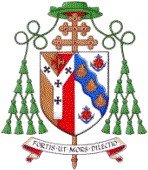 Archbishop Nichols, in his words of welcome at the start of the ordination, said: “This situation a unique occasion and a great day in the life of the diocese. Both a father and his son – after his ordination – will be serving as Catholic priests.”
Archbishop Nichols, in his words of welcome at the start of the ordination, said: “This situation a unique occasion and a great day in the life of the diocese. Both a father and his son – after his ordination – will be serving as Catholic priests.”
More than 60 Catholic priests, including Father Dominic’s father, witnessed the ceremony.
Archbishop Nichols continued: “Just as the Angel Gabriel told Mary, ‘The Holy Spirit will come upon you and the power of the Most High will cover you with its shadow’, so also this will manifest for Dominic.
“How else, except through this gift could Dominic ever make Christ present in the life of the Church? It is the same gift given all those centuries ago in Nazareth that is given in Coventry today.
“It is only our unity in the Church which ensures that we are faithful to what we have been given. This Ordination is part of a great Tradition – a great handing on – from one age to the next of his gift of the Holy Spirit in the Sacrament of Holy Orders.
“Indeed, this sense of Tradition is crucial – Apostolic Tradition. The vital question for all of us and for Dominic is where is it to be found?
“We rejoice in the answer during this Ordination Ceremony. It is to be found, with utter reliability, in union with Peter the first Apostle, and in union with his Successor the Bishop of Rome.
“It is this visible unity which gives the Church the sure capacity to be faithful in the Apostolic Tradition; to hand on whole and entire, and to explore and develop its Doctrine in a faithful and secure manner. This unity is a great joy and a pearl of great price.
“So today we thank God for Dominic’s life and ministry as a priest in the Church of England. We rejoice as he steps into the priesthood in this full Communion of the Catholic Church through his ordination in this visible Apostolic Tradition.”
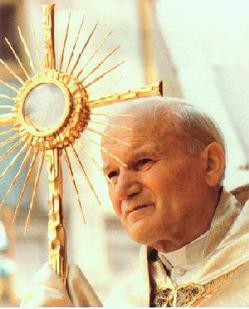 Little more than a year my friend Fr. Mark at Vultus Christi initiated a plan of prayer for the priesthood, particularly in reparation for sins committed by priests. This plan of prayer was inspired by a letter from Cardinal Claudio Hummes, OFM to the world’s bishops encouraging them to designate people, including priests, whose “ministry” it would be to pray for the priesthood in the wake of the sex abuse crisis. The point of the letter was to begin to think about and work for a renewal of the priesthood. Today begins a novena inspired by Saint Peter Julian Emyard who in 1857 began his own renewal of the priesthood adoration movement. Let’s be united in prayer for the intentions of our priests.
Little more than a year my friend Fr. Mark at Vultus Christi initiated a plan of prayer for the priesthood, particularly in reparation for sins committed by priests. This plan of prayer was inspired by a letter from Cardinal Claudio Hummes, OFM to the world’s bishops encouraging them to designate people, including priests, whose “ministry” it would be to pray for the priesthood in the wake of the sex abuse crisis. The point of the letter was to begin to think about and work for a renewal of the priesthood. Today begins a novena inspired by Saint Peter Julian Emyard who in 1857 began his own renewal of the priesthood adoration movement. Let’s be united in prayer for the intentions of our priests.


